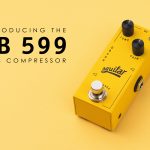Rich Brown is a really classy player and certainly knows his way around a bass better than most. Having chosen to explore plenty of musical tangents, which have seen him dabble in many different genres, Rich has appeared on countless recordings ranging from jazz to funk to latin to traditional Asian and Arabic music. His all-encompassing approach has produced a sophisticated playing style that’s a far cry from the fledgling riffs he cut while learning to play aged 17. Perhaps best known for his time with Andy Milne’s Dapp Theory, Rich plays like no one else. And he has a 6-string bass. It’s time we found out more…
Enjoy Your Time in the Shed
It’s no secret that our mental state can have a profound effect on our playing at any given moment. I do my best (with varying degrees of success) to appreciate every second I spend making music. Whether it’s on stage or in my own practice space, I know my playing is far more productive when my mind is clear and focused on the music at hand.
One of the most important things that I’ve learned about my own playing is the fact that if I can enjoy and appreciate the music being created while playing even the most rudimentary etudes, the easier it is for me to create and enjoy what I’m creating in a live setting.
If you know me, you know that I’m a very strong proponent of practising the modes. I like to practice all the modes in one key (usually Dmaj on my 6-string) moving from one shape to the next diatonically. Even when I start by playing a simple D major scale from the lowest to the highest note in that position, I try to recognise the beauty in that simple melody. Tone, articulation, note length and eliminating spaces between each note are key factors in making your practice exercises more melodic and musical. A typical shed session might focus on playing any number of the following exercises in one mode.
- Three note sequences ascending (1-2-3, 2-3-4, 3-4-5…), descending and alternating (i.e. 1-2-3, 4-3-2, 2-3-4, 5-4-3…)
- Four note sequences ascending, descending and alternating.
- Thirds ascending (1-3, 2-4, 3-5…), descending, and alternating (1-3, 4-2, 3-5, 6-4…)
- Triads ascending (1-3-5, 2-4-6, 3-5-7…), descending and alternating (i.e 1-3-5, 6-4-2, 3-5-7, 8-6-4…)
- Seventh chords ascending, descending, and alternating
- Sixth intervals ascending (1-6, 2-7, 3-8…), descending, alternating.
Take these slowly without a metronome at first. Get comfortable with the shape of the mode, and the sound of the mode. As you play these etudes try to recognise the beauty in each melody. This is music after all. The most difficult thing about playing these is not the actual playing, it’s enjoying the music you’re creating as you play them. Try to recognise the beauty in every note as you hear it the same way you do when you listen to your favourite players. This is just an outline of my own usual practice routine. You may be on a different path, and that’ s cool. Just don’t forget to have fun.
Love The Struggle
Every mistake is a lesson, and every lesson is an opportunity to grow. Learn from your mistakes and don’t let them take you into a negative space. Negativity has no place in the shed. Thoughts like “I’ll never be able to do this” or “This is too hard” or “This is boring” etc… are actually dangerous. Once you speak that negativity into existence that becomes your reality. And that reality is going to be difficult to shake.
These days I’ve been hard at work on Bach’s Violin Sonatas and Partitas. This music is really kicking my behind, and I find learning these pieces extremely challenging. That said, I choose to take the attitude that music in general is not hard. There are ideas and concepts that are currently unfamiliar to me, but I know with practice and determination those concepts will eventually be internalised.
It has to be said at this point that there is just as much danger in overconfidence. Both attitudes, whether it’s overconfidence or self-deprecation, have the same effect on your creativity. Both attitudes are ultimately egocentric and make the music about you. You can’t focus on music and creativity if you’re focused on how awesome or how terrible you may sound in the moment. I have to be aware of the fact that my ego is the antagonist to my own creativity.
Have Fun!
It’s that simple, my friends! Just have fun. We’re playing music. Now I want you to think about that for a second. The literal definition for the word ‘play’ is to engage in activity for enjoyment. I try to do the best I can to take that to heart every single time I hit the shed, or the studio, or the rehearsal space or the stage. We’re playing music! Those 3 little words give the implication that we’re having a great time. Let’s try to do exactly that from now on. For more info visit: www.fbass.com/artists/artist/rich_brown
Over at Scott's Bass Lessons....
As a member of the faculty over at ScottsBassLessons.com, Rich has been busy hosting seminars for the SBL Academy covering his approach to modes and odd time signatures. Join over 15,000 bass players in the worlds leading bass education platform, which is packed with hours of step-by-step courses, live seminars, interviews and much more. For more info click the link below.












